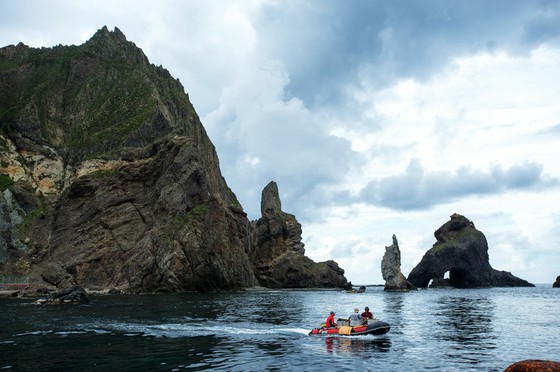 |
A joint press conference was scheduled for the three parties after the event, but only Mr. Sherman appeared at the conference.
The reason why the joint press conference was postponed was not immediately revealed, but on the 16th, the head of the Korean police agency, Chief Cabinet Secretary Kim Chang-ryong, visited Takeshima (Korean name: Dokdo). At a press conference on the morning of the 18th, Chief Cabinet Secretary Hirokazu Matsuno revealed that the Japanese side had refused.
Chief Cabinet Secretary Matsuno explained, "In view of Japan's position, it was not accepted at all, and while we were strongly protesting against the South Korean side, we decided that it was inappropriate to hold a joint press conference." Meanwhile, a senior official of the Korean presidential office said on the 18th, "It is extremely unusual if it is true that we were absent (at the press conference) for that reason."
It is the first time in 12 years since 2009 that the incumbent police chief has visited Takeshima. “There is no diplomatic meaning, to encourage staff working in remote areas,” Kim explained in an interview with Yonhap News Agency about the intention of this visit.
However, it is said that it was necessary to think comprehensively from within South Korea because the relationship between Japan and South Korea is sensitive. Meanwhile, Yonhap News Agency reported on the 18th that Kim's visit to Takeshima had been under preparation since the beginning of this month. It is said that the National Police Agency had been conducting preliminary discussions with related ministries and agencies such as the Ministry of Foreign Affairs for the visit of Director Kim, and there was no particular dissenting opinion at the meeting.
The foreign ministers' talks between Japan, the United States and South Korea have been held for the first time in about four months since July this year. The three confirmed that they would work closely together to deal with the threat of North Korea's nuclear and missile development and to realize the complete denuclearization of the Korean Peninsula. They also discussed China's hegemonic marine advancement in the East and South China Seas, climate change, and COVID-19 virus countermeasures.
The Hankyoreh newspaper, a Korean newspaper, said, "The deep distrust and confrontation between Korea and Japan over history and territory erupted in Washington, and the mood of trilateral cooperation has faded."
On the other hand, although the joint press conference was postponed, the discussions between Japan and South Korea's Vice-Minister for Foreign Affairs were held as scheduled. According to the Ministry of Foreign Affairs, they exchanged views on issues of concern between the two countries. Regarding the landing of Takeshima, the director of the Korean Police Agency, Vice-Minister Mori protested, "The landing is unacceptable. We request an appropriate response." Choi replied that he would not accept any of Japan's claims.
The Korean Ministry of Foreign Affairs provided the media with photographs taken prior to the discussions between Japan and South Korea's Vice-Minister for Foreign Affairs. The picture of Vice-Minister Mori and Vice-Minister Choi standing side by side with a hard expression makes us feel the depth of the gap between the two countries.
Mr. Sherman, who attended the exclusive press conference, emphasized that constructive talks were possible between the three countries, but how did you feel about Japan and South Korea being out of step?
The issue of Takeshima and Dokdo, what should Japan and South Korea do from now on?
Until just before the normalization of diplomatic relations between Japan and South Korea 56 years ago, South Korean and Japanese ancestors were worried for the same reason. The solution to this was the "Takeshima (Dokdo) Secret Agreement" introduced in the previous commentary. Although officially denied, the content can still be evaluated as a combination of Japanese and Korean diplomatic wisdom.
● The Takeshima/Dokdo issue is considered to have been resolved as something that must be resolved. Therefore, it is not mentioned in the Korea-Japan Basic Treaty.
● Takeshima and Dokdo will be claimed to be their own territories in both Korea and Japan. We do not object to each other's objections to this.
● When setting a fishing area in the future, both countries will define a line with Takeshima and Dokdo as their territories, and the part where the two lines overlap will be a “common water area”.
● Currently, maintain the status quo that South Korea has “occupied”. However, it will not increase security guards or build or expand new facilities.
● We will continue to keep this agreement.
Whether or not this secret agreement is effective is another matter, and I would like the Japanese and Korean diplomatic authorities of this generation to carefully read the "secret agreement of wisdom" of these predecessors. However, it doesn't make sense unless you "promise" to "keep your promise".
2021/11/25 21:15 KST


